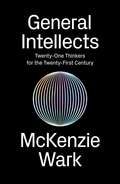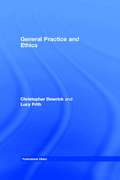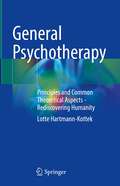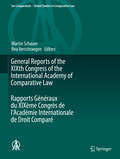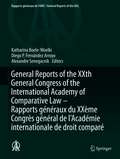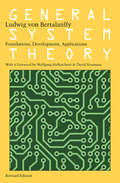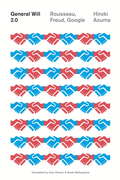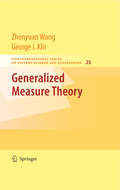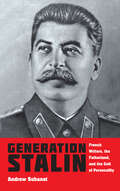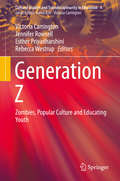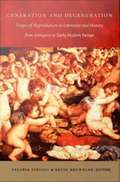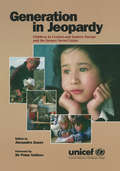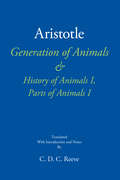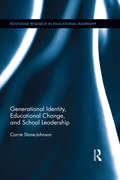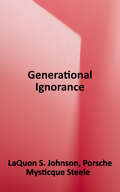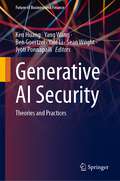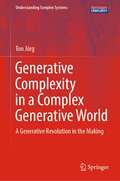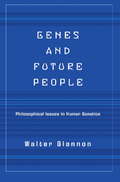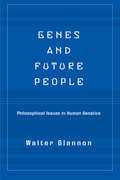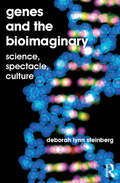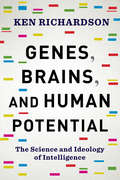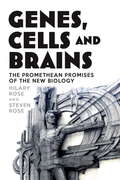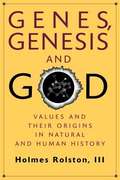- Table View
- List View
General Intellects: Twenty-Five Thinkers for the Twenty-First Century
by Mckenzie WarkA guide to the thinkers and the ideas that will shape the futureWhat happened to the public intellectuals that used to challenge and inform us? Who is the Sartre or De Beauvoir of the internet age? General Intellects argues that we no longer have such singular figures, but we do have general intellects whose writing could, if read together, explain our times. Covering topics such as culture, politics, work, technology, and the Anthropocene, each chapter is a concise account of an individual thinker, providing useful context and connections to the work of the others. McKenzie Wark’s distinctive readings are appreciations, but are also critical of how neoliberal universities militate against cooperative intellectual work to understand and change the world. The thinkers included are Amy Wendling, Kojin Karatani, Paolo Virno, Yann Moulier Boutang, Maurizio Lazzarato, Franco “Bifo” Berardi, Angela McRobbie, Paul Gilroy, Slavoj i ek, Jodi Dean, Chantal Mouffe, Wendy Brown, Judith Butler, Azumo Hiroki, Paul B. Préciado, Wendy Chun, Timothy Morton, Quentin Meillassoux, Isabelle Stengers, and Donna Haraway.
General Practice and Ethics (Professional Ethics)
by Christopher Dowrick Lucy FrithExplores the ethical issues faced by GPs in their everyday practice, addressing two central themes; the uncertainty of outcomes and effectiveness in general practice and the changing pattern of general practitioners' responsibilities.
General Psychotherapy: Principles and Common Theoretical Aspects - Rediscovering Humanity
by Lotte Hartmann-KottekThis book highlights common similarities between the various schools of psychotherapy. It provides psychotherapists with the underlying neurophysiological, developmental psychological and relationship-oriented matrix (basic needs and their regulation, deficits, trauma and conflict processing patterns, including accompanying exercises) as well as opportunities for healing correction and stabilisation - and the ways in which to apply these methods in a therapeutically mindful way for the benefit of the patient. The new university-based psychotherapy training covers the four fundamental schools of psychotherapy, i.e. the previous standard approaches plus the systemic and humanistic ones. Focusing on the common ground builds bridges of understanding and encourages collaboration. This expanded, new range of methods to access patients constitutes a substantial development in the field of psychotherapy and will also influence the psychotherapy practice of experienced colleagues. Written for medical and psychological psychotherapists, psychosomatic doctors, psychiatrists and other specialists with additional psychotherapeutic qualifications, and for students of psychotherapy.
General Reports of the XIXth Congress of the International Academy of Comparative Law Rapports Généraux du XIXème Congrès de l'Académie Internationale de Droit Comparé
by Martin Schauer Bea VerschraegenThis book deals with convergences of legal doctrine despite jurisdictional, cultural, and political barriers, and of divergences due to such barriers, examining topics that are of vital importance to contemporary legal scholars. Written by leading scholars from more than twenty countries, its thirty-two chapters present a comparative analysis of cutting-edge legal topics of the 21st century. While each of the countries covered stands alone as a sovereign state, in a technologically advanced world their disparate systems nonetheless show comparable strategies in dealing with complex legal issues. The book is a critical addition to the library of any scholar hoping to keep abreast of the major trends in contemporary law. It covers a vast area of topics that are dealt with from a comparative point of view and represents the current state of law in each area.
General Reports of the XXth General Congress of the International Academy of Comparative Law - Rapports généraux du XXème Congrès général de l'Académie internationale de droit comparé (Ius Comparatum - Global Studies in Comparative Law #50)
by Diego P. Fernández Arroyo Katharina Boele-Woelki Alexandre SenegacnikThis book explores convergences of legal doctrine despite jurisdictional, cultural and political barriers, as well as divergences due to such barriers, examining topics that are of vital importance to contemporary legal scholars. Written by leading experts from all continents, its 26 chapters present a comparative analysis of cutting-edge legal issues of the 21st century. While each of the countries covered stands alone as a sovereign state, in a technologically advanced world their disparate systems nonetheless show comparable strategies in dealing with complex legal issues. Several of the chapters show how, in addition to state normative production and state adjudication, a growing panoply of non-state instruments and non-state adjudication are becoming more and more central to the legal field. This book is a key addition to the library of any scholar wanting to keep abreast of the major trends in contemporary law. Representing the current state of law in a vast range of areas, it covers each topic from a comparative perspective. Cet ouvrage, en examinant des sujets d'une importance vitale pour les juristes contemporains, traite des convergences de la doctrine juridique malgré les barrières juridictionnelles, culturelles et politiques ainsi que des divergences dues à ces barrières. Écrits par d'éminents universitaires de tous les continents, ses 26 chapitres présentent une analyse comparative de sujets juridiques majeurs du 21e siècle. Dans un monde technologiquement avancé, bien que chaque pays analysé dans cet ouvrage demeure autonome en tant qu'État souverain, l’ensemble des systèmes disparates présente néanmoins des stratégies comparables pour traiter des questions juridiques complexes. En outre, plusieurs chapitres montrent comment, en plus de la production normative et de la résolution des différends étatiques, la panoplie croissante de différents types d'instruments non étatiques et de résolution non étatique des différends devient de plus en plus centrale dans la sphère juridique. Cet ouvrage est un ajout essentiel à la bibliothèque de tout universitaire souhaitant se tenir au courant des principales tendances du droit contemporain. Il couvre un vaste domaine de sujets traités d'un point de vue comparatif et représente l'état actuel du droit dans chaque domaine.
General System Theory: Foundations, Development, Applications
by David Rousseau Ludwig Von Bertalanffy Wolfgang HofkirchnerThe classic book on a major modern theory Bertalanffy's selected writings on his theory of laws applicable to virtually every scientific field. This conceptual approach has had a profound impact on biology, economics, psychology, and demography, with new relevancies today. The new foreword by University of Vienna system theory professor, Wolfgang Hofkirchner, and Centre for Systems Philosophy director, David Rousseau, discusses the theory's contemporary applications.
General Will 2.0
by John Person Hiroki AzumaAccording to Azuma, the collective will and the general social contract has changed the world's political landscape over the last couple of years. Azuma looks back at Rousseau and Freud then forward to Twitter and Google to express how man deals with their part of the collective will through time. Azuma challenges society's perceptions of general will by looking at three philosophies through both time and technology. Azuma's unique analysis can be as compelling as fiction while making readers feel enlightened in the process.
Generalized Measure Theory
by Zhenyuan Wang George J. KlirGeneralized Measure Theory examines the relatively new mathematical area of generalized measure theory. The exposition unfolds systematically, beginning with preliminaries and new concepts, followed by a detailed treatment of important new results regarding various types of nonadditive measures and the associated integration theory. The latter involves several types of integrals: Sugeno integrals, Choquet integrals, pan-integrals, and lower and upper integrals. All of the topics are motivated by numerous examples, culminating in a final chapter on applications of generalized measure theory. Some key features of the book include: many exercises at the end of each chapter along with relevant historical and bibliographical notes, an extensive bibliography, and name and subject indices. The work is suitable for a classroom setting at the graduate level in courses or seminars in applied mathematics, computer science, engineering, and some areas of science. A sound background in mathematical analysis is required. Since the book contains many original results by the authors, it will also appeal to researchers working in the emerging area of generalized measure theory.
Generation Stalin: French Writers, the Fatherland, and the Cult of Personality
by Andrew SobanetA look at how four French writers of the 1930s, ‘40s, and ‘50s contributed to the rise of Stalin in their country and abroad.Generation Stalin traces Joseph Stalin’s rise as a dominant figure in French political culture from the 1930s through the 1950s. Andrew Sobanet brings to light the crucial role French writers played in building Stalin’s cult of personality and in disseminating Stalinist propaganda in the international Communist sphere, including within the USSR. Based on a wide array of sources—literary, cinematic, historical, and archival—Generation Stalin situates in a broad cultural context the work of the most prominent intellectuals affiliated with the French Communist Party, including Goncourt winner Henri Barbusse, Nobel laureate Romain Rolland, renowned poet Paul Eluard, and canonical literary figure Louis Aragon. Generation Stalin arrives at a pivotal moment, with the Stalin cult and elements of Stalinist ideology resurgent in twenty-first-century Russia and authoritarianism on the rise around the world.“This is an outstanding work of intellectual history. . . . Highly recommended.” —Choice“A landmark study, brilliantly written, containing exemplary scholarship. Sobanet establishes himself with this volume as one of the foremost interpreters of French intellectual life. He brings to his study a cornucopia of historical knowledge and the finesse of a first-class literary critic.” —Lawrence D. Kritzman, editor of The Columbia History of Twentieth-Century French Thought“This is an ambitious project that is well executed, with a readership that is potentially far reaching—with implications for Russian/Stalin studies, French studies, including politics and society, as well as propaganda writing and the role of the media more generally. . . . Generation Stalin is a very timely book.” —Denis M. Provencher, author of Queer French: Globalization, Language, and Sexual Citizenship in France“Sobanet’s study of “Generation Stalin” and the four writers he associates with the group, Henri Barbusse, Romain Rolland, Paul Eluard, and Louis Aragon, is, quite simply, magisterial. Written in lucid prose informed by meticulous and wide-ranging scholarship including archival material, books, essays, press items, and other relevant documents, the book provides an in-depth study of the rise of the Stalin cult in France.” —Carol J. Murphy, author of The Allegorical Impulse in the Works of Julien Gracq: History as Rhetorical Enactment in “Le Rivage des Syrtes” and “Un Balcon en forêt”
Generation Z
by Victoria Carrington Jennifer Rowsell Esther Priyadharshini Rebecca WestrupThis book argues that the mythic figure of the zombie, so prevalent and powerful in contemporary culture, provides the opportunity to explore certain social models - such as 'childhood' and 'school', 'class' and 'family' - that so deeply underpin educational policy and practice as to be rendered invisible. It brings together authors from a range of disciplines to use contemporary zombie typologies - slave, undead, contagion - to examine the responsiveness of everyday practices of schooling such as literacy, curriculum and pedagogy to the new contexts in which children and young people develop their identities, attitudes to learning, and engage with the many publics that make up their everyday worlds.
Generation and Degeneration: Tropes of Reproduction in Literature and History from Antiquity Through Early Modern Europe
by Valeria Finucci Kevin BrownleeThis distinctive collection explores the construction of genealogies--in both the biological sense of procreation and the metaphorical sense of heritage and cultural patrimony. Focusing specifically on the discourses that inform such genealogies, Generation and Degeneration moves from Greco-Roman times to the recent past to retrace generational fantasies and discords in a variety of related contexts, from the medical to the theological, and from the literary to the historical. The discourses on reproduction, biology, degeneration, legacy, and lineage that this book broaches not only bring to the forefront concepts of sexual identity and gender politics but also show how they were culturally constructed and reconstructed through the centuries by medicine, philosophy, the visual arts, law, religion, and literature. The contributors reflect on a wide range of topics--from what makes men "manly" to the identity of Christ's father, from what kinds of erotic practices went on among women in sixteenth-century seraglios to how men's hemorrhoids can be variously labeled. Essays scrutinize stories of menstruating males and early writings on the presumed inferiority of female bodily functions. Others investigate a psychomorphology of the clitoris that challenges Freud's account of lesbianism as an infantile stage of sexual development and such topics as the geographical origins of medicine and the materialization of genealogy in the presence of Renaissance theatrical ghosts. This collection will engage those in English, comparative, Italian, Spanish, and French studies, as well as in history, history of medicine, and ancient and early modern religious studies. Contributors. Kevin Brownlee, Marina Scordilis Brownlee, Elizabeth Clark, Valeria Finucci, Dale Martin, Gianna Pomata, Maureen Quilligan, Nancy Siraisi, Peter Stallybrass,Valerie Traub
Generation in Jeopardy: Children at Risk in Eastern Europe and the Former Soviet Union
by Unicef Alexander ZouevThis disturbing volume probes beneath the rhetoric about system change in the transition societies of Central and Eastern Europe and the former Soviet Union to examine the impact of political, social, and economic dislocation, ethnic conflict and civil war on the most population: children.
Generation of Animals & History of Animals I, Parts of Animals I (The New Hackett Aristotle)
by AristotleThis edition includes new translations of Aristotle's Generation of Animals along with History of Animals I and Parts of Animals I. The translations are noteworthy for their consistency and accuracy, and fit seamlessly with the other volumes in the series, enabling Anglophone readers to read Aristotle's works in a way previously not possible. Sequentially numbered endnotes provide the information most needed at each juncture, while a detailed Index of Terms guides the reader to places where focused discussion of key notions occurs.
Generational Identity, Educational Change, and School Leadership (Routledge Research in Educational Leadership #7)
by Corrie Stone-JohnsonGenerational identity plays a large role in how teachers view educational change and school reform. Teachers of the Boomer generation, an era characterized by optimism and innovation, tend to be more resistant to change than those of Generation X, for whom standardization represents the norm, not a shift. This volume reviews five decades of research on educational change and teachers’ varying responses to it from a generational perspective, providing school leaders with insight on how best to relate to these groups to achieve a common goal. Through ongoing professional development oriented by multigenerational grouping, teachers and school leaders can define success and create a multigenerational understanding of what good teaching and leadership look like.
Generational Ignorance
by LaQuon S. JohnsonThis book focuses on the relationship(s) between ideologies incorporated from inherited trains of thought and those that have been granted the option or encouraged to utilize them to propel "progression". The book begs the question, "Why is Ignorance, Obnoxious Behavior, Or A Pathway to Prison vaguely considered when a child's inheritance is brought to the table?" Generational Ignorance presents a parable composed to denounce the myth that prized possessions predominantly comes in forms of assets, real estate, and positive productivity.
Generations of Feeling
by Barbara H. RosenweinGenerations of Feeling is the first book to provide a comprehensive history of emotions in pre- and early modern Western Europe. Charting the varieties, transformations and constants of human sentiments over the course of eleven centuries, Barbara H. Rosenwein explores the feelings expressed in a wide range of 'emotional communities' as well as the theories that served to inform and reflect their times. Focusing specifically on groups within England and France, chapters address communities as diverse as the monastery of Rievaulx in twelfth-century England and the ducal court of fifteenth-century Burgundy, assessing the ways in which emotional norms and modes of expression respond to, and in turn create, their social, religious, ideological, and cultural environments. Contemplating emotions experienced 'on the ground' as well as those theorized in the treatises of Alcuin, Thomas Aquinas, Jean Gerson and Thomas Hobbes, this insightful study offers a profound new narrative of emotional life in the West.
Generative AI Security: Theories and Practices (Future of Business and Finance)
by Sean Wright Ben Goertzel Yang Wang Ken Huang Yale Li Jyoti PonnapalliThis book explores the revolutionary intersection of Generative AI (GenAI) and cybersecurity. It presents a comprehensive guide that intertwines theories and practices, aiming to equip cybersecurity professionals, CISOs, AI researchers, developers, architects and college students with an understanding of GenAI’s profound impacts on cybersecurity. The scope of the book ranges from the foundations of GenAI, including underlying principles, advanced architectures, and cutting-edge research, to specific aspects of GenAI security such as data security, model security, application-level security, and the emerging fields of LLMOps and DevSecOps. It explores AI regulations around the globe, ethical considerations, the threat landscape, and privacy preservation. Further, it assesses the transformative potential of GenAI in reshaping the cybersecurity landscape, the ethical implications of using advanced models, and the innovative strategies required to secure GenAI applications. Lastly, the book presents an in-depth analysis of the security challenges and potential solutions specific to GenAI, and a forward-looking view of how it can redefine cybersecurity practices. By addressing these topics, it provides answers to questions on how to secure GenAI applications, as well as vital support with understanding and navigating the complex and ever-evolving regulatory environments, and how to build a resilient GenAI security program. The book offers actionable insights and hands-on resources for anyone engaged in the rapidly evolving world of GenAI and cybersecurity.
Generative Complexity in a Complex Generative World: A Generative Revolution in the Making (Understanding Complex Systems)
by Ton JörgThis book introduces a refreshing approach to twenty-first-century scientific approach in an age, which is also known as the Century of Complexity. It deals with the deep problem of complexity, being operative from the bottom-up. The current lack of understanding of complexity has led scholars into the so-called embarrassment of complexity. A long overdue paradigm shift is necessary to address complexity as generative complexity and brings readers to the edge of a scientific revolution: that is, a generative revolution in the Century of Complexity. The book offers a radical shift of paradigm from the paradigm of simplifying into the new generative paradigm of complexifying about processes that develop from the bottom-up. The book links complex generative reality with a corresponding radical new generative nature of order and explores new fronts in science. This book explores innovative concepts of interaction, of causality, of the unit of study, and of reality itself and enables readers to see complexity as generative, emergent complexity as being operative from the bottom-up. The book discusses and suggests solutions for the problem of complexity in this Century of Complexity. The author provides a new understanding of complexity based on a generative flux of forces and relations. The book aims to bring about a fundamental and foundational change in how we view and ‘do’ science for an interdisciplinary audience of academics ranging from social science and humanities to economy and biology.
Genes And Future People
by Walter GlannonBased in part on a graduate seminar on biomedical ethics he taught at McGill U. , Gannon discusses the moral implications of advances in genetics that allow unprecedented intervention in human development via genetic testing, gene therapy, genetic enhancement, cloning, and life span extension techniques. The author distinguishes between negative and positive eugenics. Annotation c. Book News, Inc. , Portland, OR (booknews. com)
Genes And Future People
by Walter GlannonAdvances in genetic technology in general and medical genetics in particular will enable us to intervene in the process of human biological development which extends from zygotes and embryos to people. This will allow us to control to a great extent the identities and the length and quality of the lives of people who already exist, as well as those we bring into existence in the near and distant future. Genes and Future People explores two general philosophical questions, one metaphysical, the other moral: (1) How do genes, and different forms of genetic intervention (gene therapy, genetic enhancement, presymptomatic genetic testing of adults, genetic testing of preimplantation embryos), affect the identities of the people who already exist and those we bring into existence? and (2) How do these interventions benefit or harm the people we cause to exist in the near future and those who will exist in the distant future by satisfying or defeating their interest in having reasonably long and disease-free lives?Genes and Future People begins by explaining the connection between genes and disease, placing genetic within a framework of evolutionary biology. It then discusses such topics as how genes and genetic intervention influence personal identity, what genetic testing of individuals and the knowledge resulting from it entails about responsibility to others who may be at risk, as well as how gene therapy and genetic enhancement can affect the identities of people and benefit or harm them. Furthermore, it discusses various moral aspects of cloning human beings and body parts. Finally, it explores the metaphysical and moral implications of genetic manipulation of the mechanisms of aging to extend the human life span.The aim Genes and Future People is to move philosophers, bioethicists, and readers in general to reflect on the extent to which genes determine whether we are healthy or diseased, our identities as persons, the quality of our lives, and our moral obligations to future generations of people.
Genes And Future People: Philosophical Issues In Human Genetics
by Walter GlannonAdvances in genetic technology in general and medical genetics in particular will enable us to intervene in the process of human biological development which extends from zygotes and embryos to people. This will allow us to control to a great extent the identities and the length and quality of the lives of people who already exist, as well as those we bring into existence in the near and distant future. Genes and Future People explores two general philosophical questions, one metaphysical, the other moral: (1) How do genes, and different forms of genetic intervention (gene therapy, genetic enhancement, presymptomatic genetic testing of adults, genetic testing of preimplantation embryos), affect the identities of the people who already exist and those we bring into existence? and (2) How do these interventions benefit or harm the people we cause to exist in the near future and those who will exist in the distant future by satisfying or defeating their interest in having reasonably long and disease-free lives?Genes and Future People begins by explaining the connection between genes and disease, placing genetic within a framework of evolutionary biology. It then discusses such topics as how genes and genetic intervention influence personal identity, what genetic testing of individuals and the knowledge resulting from it entails about responsibility to others who may be at risk, as well as how gene therapy and genetic enhancement can affect the identities of people and benefit or harm them. Furthermore, it discusses various moral aspects of cloning human beings and body parts. Finally, it explores the metaphysical and moral implications of genetic manipulation of the mechanisms of aging to extend the human life span.The aim Genes and Future People is to move philosophers, bioethicists, and readers in general to reflect on the extent to which genes determine whether we are healthy or diseased, our identities as persons, the quality of our lives, and our moral obligations to future generations of people.
Genes and the Bioimaginary: Science, Spectacle, Culture
by Deborah Lynn SteinbergGenes and the Bioimaginary examines the dramatic rise and contemporary cultural apotheosis of 'the gene'. The book traces not only the genetification of modern life but is also a journey through the complex relationship between science and culture. At the heart of this book are three interlinked questions. The first concerns the paradigmatic transformations of the 'genetics revolution': how can we understand the impact of genes on social arenas as diverse as law and agriculture, politics and medicine, genealogy and jurisprudence? Second, how has the language of genes come to pervade public discourse - as much a trope of personal narrative as of the popular imaginary? And third, how can we gain critical purchase not only on the conditions and consequences of a particular science, but on its projective seductions, the terms of its persuasion, and the dilemmas and anxieties provoked in its wake? Through a series of illuminating case studies ranging from 'gay genes' to 'Jew genes', to genes for crime; from CSI to the Innocence Project, from genetics (post)racial imaginary to its phantasies of redemption, the book examines the emergence of the gene as a pre-eminent locus of both scientific and social explanation, and as a powerful object of spectacle, projective phantasy and attachment. Genes and the Bioimaginary makes a distinctive contribution to our understanding of how knowledge comes to be not only powerful, but plausible.
Genes, Brains, and Human Potential: The Science and Ideology of Intelligence
by Ken RichardsonFor countless generations people have been told that their potential as humans is limited and fundamentally unequal. The social order, they have been assured, is arranged by powers beyond their control. More recently the appeal has been to biology, specifically the genes, brain sciences, the concept of intelligence, and powerful new technologies. Reinforced through the authority of science and a growing belief in bio-determinism, the ordering of the many for the benefit of a few has become more entrenched. Yet scientists are now waking up to the influence of ideology on research and its interpretation. In Genes, Brains, and Human Potential, Ken Richardson illustrates how the ideology of human intelligence has infiltrated genetics, brain sciences, and psychology, flourishing in the vagueness of basic concepts, a shallow nature-versus-nurture debate, and the overhyped claims of reductionists. He shows how ideology, more than pure science, has come to dominate our institutions, especially education, encouraging fatalism about the development of human intelligence among individuals and societies. Genes, Brains, and Human Potential goes much further: building on work being done in molecular biology, epigenetics, dynamical systems, evolution theory, and complexity theory, it maps a fresh understanding of intelligence and the development of human potential. Concluding with an upbeat message for human possibilities, this synthesis of diverse perspectives will engender new conversations among students, researchers, and other interested readers.
Genes, Cells and Brains
by Hilary Rose Steven RoseOur fates lie in our genes and not in the stars, said James Watson, co-discoverer of the structure of DNA. But Watson could not have predicted the scale of the industry now dedicated to this new frontier. Since the launch of the multibillion-dollar Human Genome Project, the biosciences have promised miracle cures and radical new ways of understanding who we are. But where is the new world we were promised?In Genes, Cells, and Brains, feminist sociologist Hilary Rose and neuroscientist Steven Rose take on the bioscience industry and its claims. Examining the rivalries between public and private sequencers,the establishment of biobanks, and the rise of stem cell research, they ask why the promised cornucopia of health benefits has failed to emerge. Has bioethics simply become an enterprise? As bodies become increasingly commodified, perhaps the failure to deliver on these promises lies in genomics itself.
Genes, Genesis, and God: Values and Their Origins in Natural and Human History
by Holmes Rolston IIIHolmes Rolston challenges the sociobiological orthodoxy that would naturalize science, ethics, and religion. The book argues that genetic processes are not blind, selfish, and contingent, and that nature is therefore not value-free. The author examines the emergence of complex biodiversity through evolutionary history. Especially remarkable in this narrative is the genesis of human beings with their capacities for science, ethics, and religion. A major conceptual task of the book is to relate cultural genesis to natural genesis. There is also a general account of how values are created and transmitted in both natural and human cultural history. The book is written by one of the most well-respected figures in the philosophy of biology and religion.
